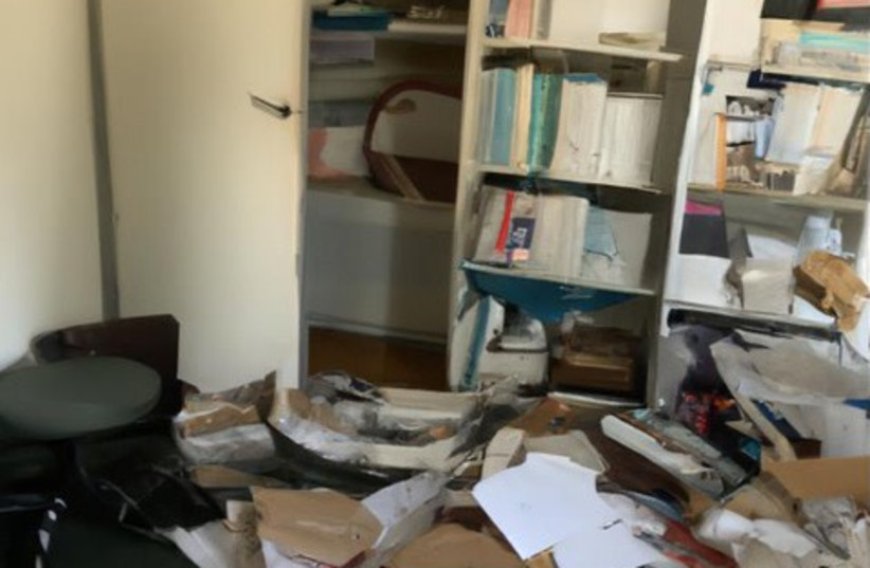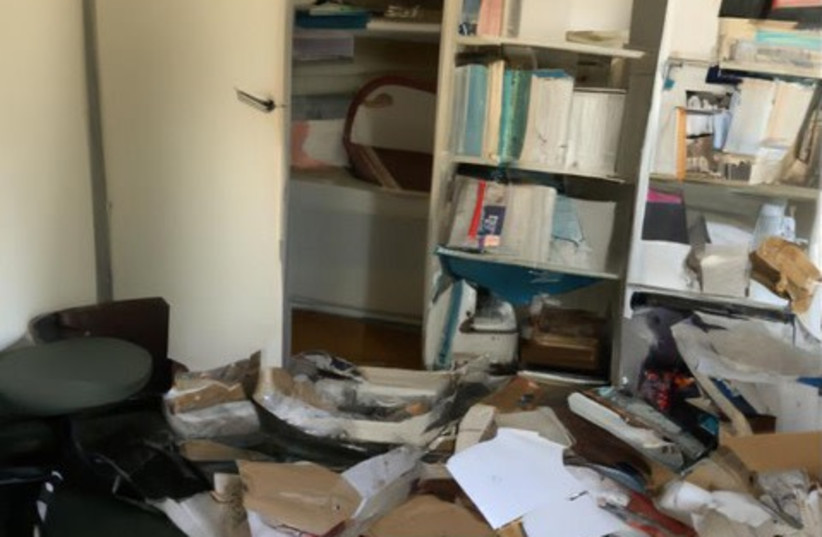Israeli NGO aids in cleanup of ransacked Holocaust survivor home
Israeli NGO aids in cleanup of ransacked Holocaust survivor home The Jerusalem Post

Last week in Ramat Aviv: Community Comes Together to Support Holocaust Survivor
Last week in Ramat Aviv, a neighborhood in north Tel Aviv, the apartment of a Holocaust survivor and activist was robbed and ransacked. This devastating event not only left a 93-year-old woman’s home destroyed, but the event became a call to action for volunteers to spring into action and come to her aid with a community cleanup Sunday morning.
The community response to the organization’s quick mobilization showed an overwhelming amount of support. The identity of the Holocaust survivor has remained private following a traumatic home invasion, though some details were released.
The woman lived independently in a large home in Ramat Aviv and returned to her home to find that not only had her home been broken into, but people had “squatted,” another term for unlawfully occupying a living space. Several important archived documents related to Holocaust memory and preservation were scattered through the home and damaged, as well as valuables being sifted through, and property damage was present throughout the home.
Adopt-a-Safta comes to the rescue
But he eventually managed to receive assistance from Adopt-a-Safta. This NGO works with social workers, among other community members, to identify both Holocaust survivors and lonely elderly people throughout the country and pairs them with young people to an “adopted” family member who would embrace them as their own.

Atia connected with Jay Shultz, the founder of Adopt-a-Safta, who sent out a community inquiry calling for volunteers to assist in cleanup efforts, though the project did not fall into their normal repertoire. However, Shultz knew that this was not something to ignore, and quickly garnered more than 100 sign-ups from volunteers who wanted to assist in cleanup efforts.
“Loneliness and isolation impact survivors in a different way,” Shultz told The Jerusalem Post. “This isn’t what the organization typically does, but we do organize special projects that require bringing together as many volunteers as possible to help someone, like in this situation. The need is clear and present so we had to act fast,” he added.
The volunteer coordinator and Shultz both shared that one of the volunteers involved in the effort was an archivist/historian who had previously worked at Yad Vashem for multiple years. This person’s specific skillset was valuable in this project, helping sort through significant documents, which were then organized, identified, and preserved in boxes.
The home was so filled with items and in less-than-pristine condition that the first day of the effort resulted in at least 50 big trash bags filled with the contents of the home. They had around 12 volunteers involved during Sunday’s all-day cleanup. “This covers maybe 10% of it all, we are nowhere near done,” Atia stated. “It is a big home with many memories,” he said, adding that police responding to the break-in allegedly told the victim that they were sorry it happened, but they could do nothing because there wasn’t time or personnel available.
“I just don’t really understand how someone can live like this, and how the municipality and government would somehow not know what’s going on… or know, and just not do anything about it,” he told the Post.
He also noted that at the scene, it was not clear what the suspects, who are still at large, were looking for in her home.
Now, he wants to know what his next steps will be. He reached out to local officials in seek of help but was met with radio silence. “The municipality didn’t call me back. I want to understand how we can help her,” he stated.
He added that it seems that international people living in Israel have more sympathy and support for Holocaust survivors than he’s felt his own country has. “I’m ashamed of my country, and something needs to be done to help these people in the future,” he stated.
SDGs, Targets, and Indicators
1. SDGs Addressed or Connected to the Issues Highlighted in the Article
- SDG 1: No Poverty
- SDG 3: Good Health and Well-being
- SDG 10: Reduced Inequalities
- SDG 11: Sustainable Cities and Communities
- SDG 16: Peace, Justice, and Strong Institutions
2. Specific Targets Based on the Article’s Content
- Target 1.5: By 2030, build the resilience of the poor and those in vulnerable situations and reduce their exposure and vulnerability to climate-related extreme events and other economic, social, and environmental shocks and disasters.
- Target 3.4: By 2030, reduce by one-third premature mortality from non-communicable diseases through prevention and treatment and promote mental health and well-being.
- Target 10.2: By 2030, empower and promote the social, economic, and political inclusion of all, irrespective of age, sex, disability, race, ethnicity, origin, religion, or economic or other status.
- Target 11.7: By 2030, provide universal access to safe, inclusive, and accessible, green, and public spaces, in particular for women and children, older persons, and persons with disabilities.
- Target 16.3: Promote the rule of law at the national and international levels and ensure equal access to justice for all.
3. Indicators Mentioned or Implied in the Article
- Indicator 1.5.1: Number of deaths, missing persons, and directly affected persons attributed to disasters per 100,000 population.
- Indicator 3.4.1: Mortality rate attributed to cardiovascular disease, cancer, diabetes, or chronic respiratory disease.
- Indicator 10.2.1: Proportion of people living below 50 percent of median income, disaggregated by age, sex, and persons with disabilities.
- Indicator 11.7.1: Average share of the built-up area of cities that is open space for public use for all, by sex, age, and persons with disabilities.
- Indicator 16.3.1: Proportion of victims of violence in the previous 12 months who reported their victimization to competent authorities or other officially recognized mechanisms.
Table: SDGs, Targets, and Indicators
| SDGs | Targets | Indicators |
|---|---|---|
| SDG 1: No Poverty | Target 1.5: By 2030, build the resilience of the poor and those in vulnerable situations and reduce their exposure and vulnerability to climate-related extreme events and other economic, social, and environmental shocks and disasters. | Indicator 1.5.1: Number of deaths, missing persons, and directly affected persons attributed to disasters per 100,000 population. |
| SDG 3: Good Health and Well-being | Target 3.4: By 2030, reduce by one-third premature mortality from non-communicable diseases through prevention and treatment and promote mental health and well-being. | Indicator 3.4.1: Mortality rate attributed to cardiovascular disease, cancer, diabetes, or chronic respiratory disease. |
| SDG 10: Reduced Inequalities | Target 10.2: By 2030, empower and promote the social, economic, and political inclusion of all, irrespective of age, sex, disability, race, ethnicity, origin, religion, or economic or other status. | Indicator 10.2.1: Proportion of people living below 50 percent of median income, disaggregated by age, sex, and persons with disabilities. |
| SDG 11: Sustainable Cities and Communities | Target 11.7: By 2030, provide universal access to safe, inclusive, and accessible, green, and public spaces, in particular for women and children, older persons, and persons with disabilities. | Indicator 11.7.1: Average share of the built-up area of cities that is open space for public use for all, by sex, age, and persons with disabilities. |
| SDG 16: Peace, Justice, and Strong Institutions | Target 16.3: Promote the rule of law at the national and international levels and ensure equal access to justice for all. | Indicator 16.3.1: Proportion of victims of violence in the previous 12 months who reported their victimization to competent authorities or other officially recognized mechanisms. |
Behold! This splendid article springs forth from the wellspring of knowledge, shaped by a wondrous proprietary AI technology that delved into a vast ocean of data, illuminating the path towards the Sustainable Development Goals. Remember that all rights are reserved by SDG Investors LLC, empowering us to champion progress together.
Source: jpost.com

Join us, as fellow seekers of change, on a transformative journey at https://sdgtalks.ai/welcome, where you can become a member and actively contribute to shaping a brighter future.







